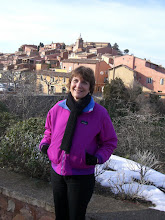A couple of years ago our daughter-in-law Lorène started telling us about a writer of crime fiction she really enjoyed, Fred Vargas. While I once read a reference to “him” in a book review, Fred is indeed a woman, born Frédérique Audouin-Rouzeau in Paris 1957. Trained as a medieval historian and archeozoologist, she has a lengthy opus on the plague, Les Chemins de la peste. But just over twenty years ago, she took up the pseudonym Vargas and began writing polars or rompols, as she refers to them. When applying for a sabbatical last year, I decided to research this highly popular, award-winning author and I have not been disappointed. Although her books are filled with the multiple murders, investigations, and red herrings typical of detective novels, the imagined world she creates is unique in many ways.
Here, it is not the solving of the mystery that is all important; in fact, on a few occasions I have had the ending figured out well ahead of time. Hands down, her idiosyncratic characters are the most enjoyable part of her work. Coming from all walks of life—politicians, professors, artists, prostitutes, café owners, students—they form a very human and believable world. No one’s life is perfect; no one has all the answers, not even the most clever detective; on the other hand, no one is a complete imbecile. Vargas is a keen observer of human nature: how we tend to repeat the same things, our recurring gestures, the way our minds jump around from one subject to the next. Particularly appealing are some of her returning characters like the intuitive and slow-moving commissaire Adamsberg and three young men, Mathias, Marc, and Lucien, known as les trois evangélistes.
Humor plays a big role in Vargas’s fiction. The youth of the three evangelists, for example, provides her with the occasion to use familiar and sometimes crude language which can be quite amusing. The French expression être dans la merde, whose connotation is more like “to be in big trouble,” is frequently repeated with interesting variations throughout Debout les morts (translated as The Three Evangelists in English) to describe the down-on-their-luck young men. Their diverse scholarly backgrounds also allow opportunities to enrich the book in a comical way. Marc, the medievalist, needs to find roommates to share la baraque pourrie (“the rotten shack”) he’s found to rent. He immediately thinks of Mathias, the “hunter-gatherer” prehistorian, but can’t imagine living with someone whose research separates them by 30,000 years! When Mathias then suggests Lucien, a contemporanéiste specializing in World War I, as a possible third person to share the rent, Marc is at first outraged: Il y a des limites à tout! (“Everything has limits!”), but eventually acquiesces upon learning that Lucien is dans la merde as well.
For those of you whose knowledge of French is nil or limited, there is good news: at least six of Vargas’s novels have been translated into English. Her works can, in fact, be found in over forty foreign countries. For people wishing to perfectionner la langue ("improve your language skills), I would suggest perhaps getting both the French and English copies of the same book, Debout les morts and The Three Evangelists, for example. That way, you could read, say, the English version first and follow it by the French. Bonne lecture! Happy reading!

No comments:
Post a Comment